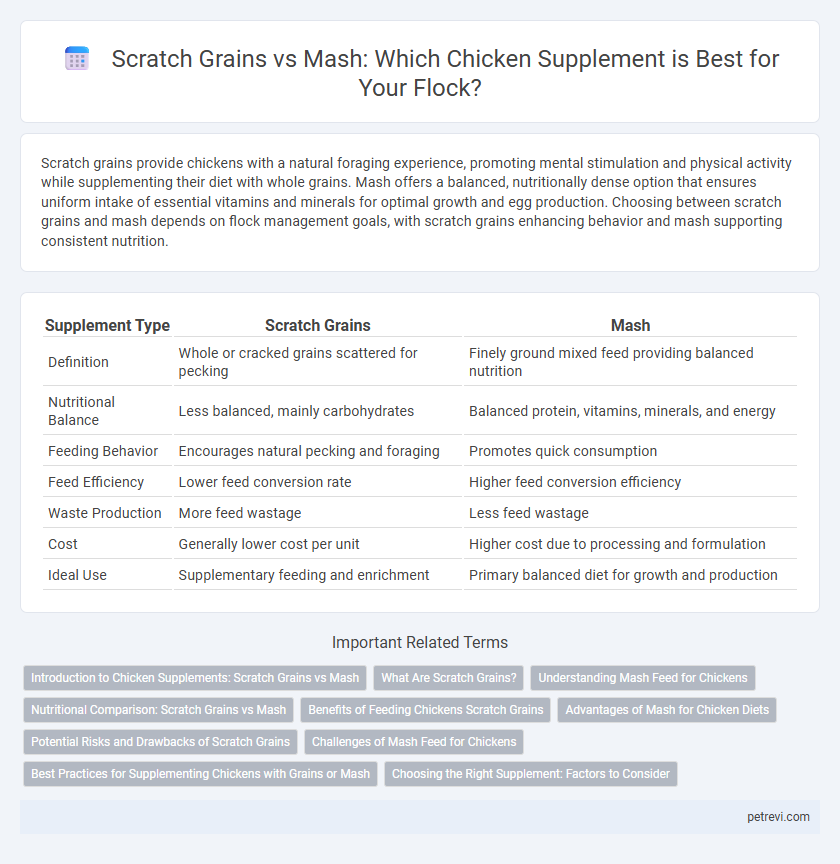Scratch grains provide chickens with a natural foraging experience, promoting mental stimulation and physical activity while supplementing their diet with whole grains. Mash offers a balanced, nutritionally dense option that ensures uniform intake of essential vitamins and minerals for optimal growth and egg production. Choosing between scratch grains and mash depends on flock management goals, with scratch grains enhancing behavior and mash supporting consistent nutrition.
Table of Comparison
| Supplement Type | Scratch Grains | Mash |
|---|---|---|
| Definition | Whole or cracked grains scattered for pecking | Finely ground mixed feed providing balanced nutrition |
| Nutritional Balance | Less balanced, mainly carbohydrates | Balanced protein, vitamins, minerals, and energy |
| Feeding Behavior | Encourages natural pecking and foraging | Promotes quick consumption |
| Feed Efficiency | Lower feed conversion rate | Higher feed conversion efficiency |
| Waste Production | More feed wastage | Less feed wastage |
| Cost | Generally lower cost per unit | Higher cost due to processing and formulation |
| Ideal Use | Supplementary feeding and enrichment | Primary balanced diet for growth and production |
Introduction to Chicken Supplements: Scratch Grains vs Mash
Scratch grains provide chickens with a natural foraging experience, enhancing their physical activity and digestive health by encouraging pecking and scratching behaviors. Mash supplements offer a balanced, nutrient-dense diet formulated to meet the specific protein, vitamin, and mineral needs essential for optimal growth and egg production. Understanding the differences between scratch grains and mash enables poultry keepers to optimize chicken nutrition and health effectively.
What Are Scratch Grains?
Scratch grains are a combination of whole or cracked grains such as corn, wheat, oats, and barley, designed to encourage natural foraging behavior in chickens. These grains provide essential carbohydrates, fiber, and some protein, promoting physical activity and pecking instincts. As a supplement, scratch grains complement a balanced diet but lack the complete nutrients found in formulated mash feeds.
Understanding Mash Feed for Chickens
Mash feed for chickens consists of finely ground ingredients mixed to provide balanced nutrition, enhancing digestion and nutrient absorption compared to scratch grains. Unlike scratch grains, which encourage natural foraging behavior but may lead to selective eating, mash feed ensures consistent intake of essential vitamins, minerals, and proteins crucial for growth and egg production. Optimal mash formulations include corn, soybean meal, vitamins, and minerals tailored to different chicken breeds and production stages, improving overall flock health and performance.
Nutritional Comparison: Scratch Grains vs Mash
Scratch grains offer a more natural foraging experience, providing higher fiber content but lower protein levels compared to mash feed. Mash supplements are finely ground, enabling better nutrient absorption, with optimized protein, vitamin, and mineral balance to support rapid growth and egg production. Choosing between scratch grains and mash depends on balancing coarse texture benefits against the comprehensive nutritional profile needed for optimal poultry health.
Benefits of Feeding Chickens Scratch Grains
Feeding chickens scratch grains stimulates natural foraging behavior, promoting physical activity and reducing stress. Scratch grains provide a source of carbohydrates and small amounts of protein, supporting energy levels and overall health. Offering scratch grains as a supplement encourages selective eating, enhancing gut health by diversifying nutrient intake.
Advantages of Mash for Chicken Diets
Mash feed for chickens offers superior nutrient uniformity, ensuring each bite delivers a balanced intake of proteins, vitamins, and minerals essential for optimal growth and egg production. Unlike scratch grains, mash minimizes selective feeding, reducing nutrient wastage and promoting consistent digestion and absorption. Its fine texture supports improved feed conversion ratios and enhanced gut health in poultry, making it highly effective for commercial and backyard flocks.
Potential Risks and Drawbacks of Scratch Grains
Scratch grains for chicken feed pose potential risks such as nutritional imbalance due to their inconsistent nutrient profile compared to formulated mash. Feeding scratch grains exclusively can lead to selective feeding, where chickens consume high-energy grains and neglect essential vitamins and minerals, resulting in deficiencies. Moreover, scratch grains increase the risk of overeating and digestive issues, including impacted crops and obesity, affecting overall flock health and productivity.
Challenges of Mash Feed for Chickens
Mash feed for chickens often presents challenges such as increased feed wastage due to fine particles easily scattered by pecking, leading to higher costs and reduced efficiency. The moisture content in mash can promote mold growth, causing potential health risks and decreased nutrient absorption in poultry. Moreover, chickens may struggle with uniform particle size, resulting in inconsistent nutrient intake and impaired growth performance.
Best Practices for Supplementing Chickens with Grains or Mash
Scratch grains provide chickens with natural foraging behavior stimulation and help maintain digestive health through coarse particles, while mash offers a balanced nutrient mix that ensures uniform intake and reduces selective feeding. Best practices for supplementing chickens with grains or mash include offering mash as the primary diet to meet nutritional requirements and using scratch grains sparingly to encourage activity without disrupting nutrient balance. Ensuring fresh, clean water and adjusting supplement types based on age and production stage maximizes chicken health and productivity.
Choosing the Right Supplement: Factors to Consider
Choosing the right supplement for chickens between scratch grains and mash depends on nutritional balance, age, and feeding behavior. Scratch grains provide coarse texture that encourages natural foraging but may lack uniform nutrient distribution, while mash offers a consistent blend of nutrients ideal for younger birds or precise dietary control. Consider protein content, feed efficiency, and ease of digestion to match the supplement type with the flock's specific needs and production goals.
Scratch Grains vs Mash for Chicken Supplement Infographic

 petrevi.com
petrevi.com